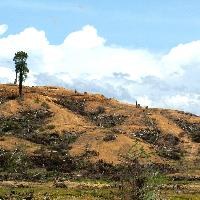(STRASBOURG) – The European Parliament voted Tuesday in favour of a report calling on the EU to stop funding and contributing to deforestation, much of which is caused by agricultural expansion and the production of palm oil.
As a counter to the impact of unsustainable palm oil production, such as deforestation and habitat degradation, particularly in South-East Asia, MEPs want the EU to introduce a single certification scheme for palm oil entering the EU market and to phase out the use of vegetable oils that drive deforestation by 2020.
“The problem of deforestation threatens the Global Agreement on Climate Change COP21 and UN Sustainable Development Goals,” said Katerina Konecna MEP, who drafted the resolution. “We want an open debate with all players so we can make palm oil production sustainable, without cutting down forests and in compliance with dignified human rights conditions,” she added.
46% of the palm oil imported by the EU is used to produce biofuels, requiring the use of about one million hectares of tropical soils. The resolution calls on the EU Commission to take measures to phase out the use of vegetable oils that drive deforestation, including palm oil, as a component of biofuels, preferably by 2020.
Parliament also advocates a single certification scheme to guarantee that only sustainably produced palm oil enters the EU market.
“The Parliament is right to recognise the huge responsibility that the EU has to stop deforestation and how important this is for climate action and sustainable development,” said Greenpeace EU’s forest policy director: “We are at one minute to midnight the European Commission must not lose more time in putting forward an EU action plan to make Europe a deforestation-free economy and turn the tide on global forest destruction.”
The parliamentary report:
- Identifies the drivers of deforestation, highlights the crucial role of forests for climate mitigation and sustainable development, and the commitments made by the EU to take action to preserve and restore forests.
- Analyses the magnitude of the environmental and social impacts resulting from palm oil production, and the particular responsibility of the EU.
- Recognises that industry self-regulation is not enough to stop deforestation, and points to the weak standards and enforcement levels of the main certification schemes for sustainable palm oil.
- Recognises that it is possible to produce palm oil in a responsible way, e.g. with the use of the High-Carbon Stock approach and the standards developed by the Palm Oil Innovation Group.
- Calls on the European Commission to develop an EU action plan on deforestation which would include concrete regulatory measures to make EU supply chains and financial transactions deforestation-free.
- Calls for a phase-out, by 2020, of the use of biofuels based on vegetable oils.
- Calls on the European Commission and EU member states to provide support to developing countries for implementing environmentally and socially responsible production practices, and for securing the rights and livelihoods of indigenous peoples and local communities.
Further information, European Parliament
Adopted text (2016/2222(INI) will soon be available here (04.04.2017)



